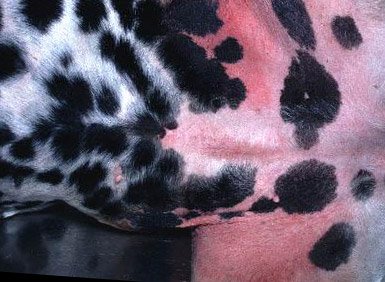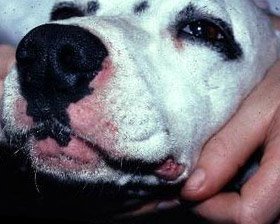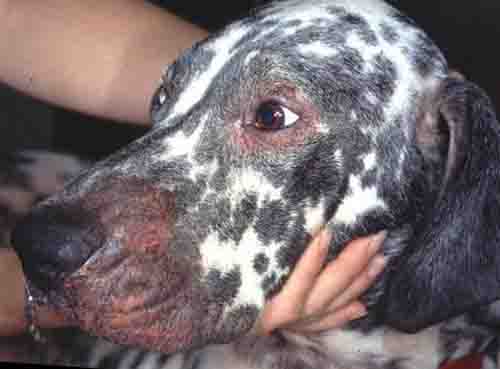"Dogs can have adverse reactions to foods due to allergy, an intolerance or as a toxic reaction. Each of these are described below. A food allergy is an immune system response where a food intolerance is a physiological response. Food allergy is the third most common allergy in dogs after fleas and environmental allergens such as pollen.
In general, symptoms include diarrhea and vomiting. Both intolerance and allergy result in similar symptoms, making it difficult to diagnose the underlying cause of any food related condition. Symptoms frequently start to appear as young adults.
Skin reactions are usually associated with a dog food allergy, which occurs in 20% to 30% of dogs with food allergies (called atopic dermatitis or if caused by food allergy, food allergy dermatitis or cutaneous adverse food reactions). Atopy refers to the genetic hypersensitivity to food and other environmental allergens such as pollen. Because both environmental and food allergens result in the same skin symptoms, diagnosis is challenging. Problems with the gastrointestinal system can also be associated with allergy.
Reactions are frequently seen when a new food is introduced for a dietary change is made. Signs may disappear after the diet is changed back, which is often a challenging process since the average commercial dog food has 60 different ingredients."
Causes and Pathophysiology of Dog Food Reactions
It is not known why a dog will develop or start food allergies, we only know how the dog's body reacts to allergens.
- Adverse Food Reaction: This occurs when there is an abnormal reaction to any food that is ingested. The term is used when the specific cause of the problem has not been identified.
- Food Hypersensitivity or Allergy: This is an immune system response (immune-mediated). The dog's body reacts to the food with antibodies that can be measured. Food allergies are usually due to some type of hypersensitivity reaction. Sometimes there is a cross reaction between allergens (the main allergen in beef (IgG Bos d7),
also shows adverse reactions to meat from milk, deer, and lamb.)
Allergies in dogs are usually triggered by these common water soluble glycoproteins/ingredients: - Chicken
- Beef
- Eggs
- Milk
- Corn
- Wheat
- Soybeans
- Grains
- Pork
- Fish

- Dog Food Intolerance: Unlike allergy which is immune-mediated, food intolerance is non-immune-mediated. It is a physiological food reaction to an additive, ingredient or medication. Usually it is causing by some defect that makes it difficult for the body to use the food. It can also cause the body to regard the food as a toxin. This often happens when a dog ingests a large quantity of a particular food. The body does not produce antibodies in reaction to the food.
- Food Idiosyncrasy: This is also a non-immune-mediated reaction that is not normal. It is triggered by the quantity of food consumed and not to any effects brought on by medications or physiology. The response is similar to a food allergy reaction.
- Anaphylactic Food Reaction: This is an immune system response where IgE antibodies are formed which case the release of vascularly active mediators of mast cells and basophile granulocytes.
- Pharmacological Reactions to Food: Specific food ingredients can react as if they are a drug. For example, some ingredients in chocolate have a toxic effect in dogs.
- Metabolical Food Reactions: This refers to food reactions related to the digestion of specific ingredients. For example, some dogs have an enzyme deficiency which results in lactose intolerance.
- Toxicity and Intoxication Related to Food: Some ingredients in food act as a toxin in dogs such as alkaloids that exist in garlic and onions. Contaminated food also have parasites that produce harmful toxins.
Body Systems Affected
Parts of the dog’s body affected by an allergic reaction or intolerance include:
- Skin

- Hormonal systems (endocrine)
- Gastrointestinal

Problems by Breed
- Wheaten Terriers: inherit food allergies
- Irish Setters: gluten sensitivity which manifests itself at age 4 to 7 months
Symptoms
Dog food allergies and intolerance symptoms can appear at any age.
Food Intolerance:
- Diarrhea
- Vomiting
- Flatulence
- Anorexia (appetite loss)
- Abdominal discomfort
Food Allergy:

- Skin rash (dermatitis)
- Skin Itch (puritus), particularly on the face, feet and ears
- Increased licking or skin scratching
- Reddened skin (erythematous or erythema)
- Skin lesions (papules, pustules)
- Hair loss
- Skin odor
- Secondary skin infections (primary cause is the allergy which harms the skin, allowing bacteria to colonize and take hold)
- Gastrointestinal problems
- Vomiting
- Diarrhea
- Gas/flatulence
- Rumbly stomach sounds (borborygmos)
- Frequent stools
- Changes in stools
Diagnosis
A veterinarian will do a physical exam to look for signs of pain or discomfort as well as bloating.
Several disorders will need to be eliminated as the cause before a diagnosis of food intolerance or allergy is reached:
- Inflammatory bowel disease (IBD)
- Parasitism
- Exocrine Pancreatic insufficiency
- Antibiotic responsive diarrhea
Various types of laboratory (blood, urine) and imaging tests are used to eliminate other possible causes.
Treatment
An elimination diet is often used to identify a food ingredient causing the problem. Here the diet is reduced to a simple protein and carb such as chicken and rice. The elimination diet is used for 8 to 12 weeks. Supplements are not needed if diet lasts 8 weeks or less unless advised by a veterinarian.
An allergy test can help to identify any allergens.
If the dog starts to improve, then other ingredients are added back into the diet until the offending ingredient is identified. If not practical, a dog may continue on a simpler diet.
If dogs are not responsive to the elimination diet, then the veterinarian will repeat tests for inflammatory bowel disease (IBD).
The prognosis is excellent once the diet is corrected. The exception is the Wheaten Terrier that has a food allergy.
Have A Question For Our Vet About A Dog Stomach Problem?
Do you have a question for our veterinarian about a dog stomach problem? Share it and we will answer it for free!
Please include your dog's age, breed, medical history and if possible, a picture of the condition.
We will do our best to get back to you quickly (it depends on how many questions we receive each day). If you do require an immediate response we suggest using this online dog veterinary service that is available now.
Researched by: Jeff Grill
